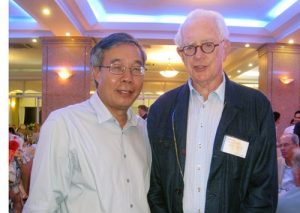
In the context of studying in the U.S., Harvard University is always a dream gateway for many Vietnamese students. It is considered one of the best places that provide students with the resources to realize their dreams during their studies and after graduation, thanks to its incredibly rich resources and a global network of connections with Harvard alumni and institutions worldwide. To step into Harvard, applicants must not only prepare a complete application package but also perform well in the interview with the school’s representative. A brief exchange with Mr. Trần Đức Cảnh (*), a former member of the admissions committee for the Massachusetts region (USA), who has over ten years of experience assisting Harvard University in the admissions process, is hoped to provide applicants with useful interview tips.
Can you share what applicants should prepare to ensure a smooth interview?
There is no universal formula for getting into Harvard University. Applicants must have passion, ambition to pursue their dreams, and view academics as a means to achieve what they want. Harvard typically favors students who are dynamic, resilient, and have clear future goals rather than those who are merely academically inclined. During the interview, the interviewer often pays attention to the applicant’s demeanor, gestures, behavior, and facial expressions, not just their answers. Therefore, most interviews are conducted either in person or through applications like Skype or Facetime, carried out by alumni, faculty, or members of the university.

What are some of the “plus points” for an applicant, in your opinion?
Applicants who demonstrate confidence and optimism in their expressions and words can easily create a positive impression on the interviewer. Students who are confident, proactive, have a bit of humor, and creativity in their answers are more likely to convince the interviewer.
Vietnamese students often exhibit shyness, hesitation, and reluctance to make eye contact with the interviewer. They also tend to lack independence in expressing or asserting their own opinions. Perhaps because they are often influenced by their school, society, and family, they make few decisions on their own despite being academically excellent. Fortunately, society is gradually changing, and young people are becoming more confident and independent every day.
Additionally, students need to present and defend their viewpoints and opinions on social, political, and life issues… instead of speaking generally or saying what others want to hear.
Do interviewers often ask tricky questions to challenge students?
I think it’s rare. Typically, the questions are designed to assess the student’s knowledge, viewpoints, and ability to grasp the current social situation, not to make it difficult for them. If a question is beyond their understanding, students should frankly admit they don’t know the issue, avoiding roundabout answers.
A common interview question is: If you were admitted to Harvard, how would you contribute to the school during your time there? What are your future dreams, and what steps will you take to achieve them? When you look in the mirror, how do you envision yourself 10, 20 years from now?
Students should answer in a way that demonstrates their ability to connect with the community and make meaningful contributions to the student body at Harvard. Harvard often values students with a spirit of community service and a desire to make the world a better place. On the other hand, students who only express interest in material aspects such as salary and job opportunities after graduation are usually not highly regarded.
It’s said that Harvard also “favors” students with a strong personality. Is this true?
Only if that personality reflects the applicant’s resilience. Most students applying to Harvard have very high academic scores, so we often look for those who have the potential for greater success, yet also have a realistic foundation. I remember interviewing a Jewish student from a very wealthy family. Despite sitting before an older interviewer, he confidently crossed his legs and spoke very assuredly, but with a slightly arrogant attitude. In the first 15 minutes of the interview, I felt amused but also somewhat uncomfortable. However, when I heard him talk about his volunteer trips to South America during summer breaks, his empathy and understanding of the real-life struggles of farmers in those difficult regions, and the lessons he learned from his experiences, I was convinced.
Interviewers are often Harvard alumni who understand the school well and have a wealth of life experience. You can confidently ask them about their experiences or practical advice if you get accepted into Harvard. I think they will be happy to share and might make the interview conversation more interesting and meaningful.
Interviewing applicants every year must be an enjoyable job?
Indeed, there are applicants so impressive that I can’t forget them even years later. One of them was a small Chinese girl who left an impression of rustic appearance. But after the interview, she made a remarkable impression with her advocacy skills, persuasion, and leadership ability even at a young age. She was a petite student who dared to petition the government against a policy banning dog ownership in her area and succeeded. For this reason, when Harvard placed her on the waiting list with a slim hope of admission, I fought to have her officially accepted.
It can be said that interviewing applicants for Harvard University is a job I loved so much that even when I no longer do it, I still miss it. Each applicant provides me with an interesting picture, and the young people even update me on new knowledge and life lessons. I hope my experiences will increasingly help many Vietnamese students confidently step through the doors of prestigious universities. So that when they leave school, they will become pioneers and great leaders for the country in the future.
Thank you for your insights.
Interview conducted by TƯỜNG LAM